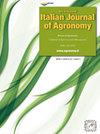Plant growth-promoting bacteria isolated from sugarcane improve the survival of micropropagated plants during acclimatisation
IF 2.1
3区 农林科学
Q1 AGRONOMY
引用次数: 0
Abstract
The plant microbiome plays an important role in nutrient acquisition and buffering plant hosts against abiotic and biotic stress. During in vitro propagation of sugarcane, pathogenic microorganisms are eliminated and most of the beneficial endophytic microorganisms. The objective of this study was to isolate and characterise potential plant growth-promoting bacteria (PGPB) from sugarcane and to analyse their ability to improve the survival of micropropagated sugarcane plantlets during the acclimatisation stage. First, bacterial isolates from sugarcane were identified by partial 16S rDNA sequencing and tested for plant growth-promoting (PGP) features, such as inorganic and organic phosphate solubilisation nitrogen fixation, siderophore synthesis, indole-3-acetic acid production, tolerance to abiotic stress and antibiotics production. Then three bacterial strains with multiple PGP traits were independently applied to micropropagated seedlings of the sugarcane variety TUC 03-12 when the plants were transferred to a nursery for ex vitro acclimatisation. The effect of selected PGPB on survival rates of micropropagated plantlets was evaluated in three independent assays, using different batches of seedlings. Thirty days after inoculation, 182-Bacillus and 336-Pseudomonas isolates significantly improved the transferred plants survival rate. High variability in plant survival among independent experiments was observed, but treatments with the 336-Pseudomonas strain showed a low mortality rate (20%) in all assays. This procedure constitutes a biological tool to improve the survival of micropropagated plants during greenhouse acclimatisation. Furthermore, it provides an initial tool for selecting bacteria with possible PGP effects in the field. Highlights - A total of 162 isolates obtained from the rhizosphere, rhizoplane, roots, and stems of sugarcane were characterised for plant growthpromoting features and identified by partial 16S rDNA sequencing. - Two PGPBs strains isolated from sugarcane (182-Bacillus and 336-Pseudomonas) significantly improved survival rates of micropropagated seedlings during the acclimatisation stage. - Under different stress conditions, the 336-Pseudomonas strain improved the survival of micropropagated plants during the acclimatisation stage.从甘蔗中分离出的植物生长促进菌提高了微繁植物在适应过程中的存活率
植物微生物组在营养获取和缓冲植物宿主免受非生物和生物胁迫方面发挥着重要作用。在甘蔗的体外繁殖过程中,病原微生物和大多数有益的内生微生物被清除。本研究的目的是从甘蔗中分离和鉴定潜在的植物生长促进细菌(PGPB),并分析它们在驯化阶段提高微繁殖甘蔗植株存活率的能力。首先,通过部分16S rDNA测序鉴定了甘蔗中的细菌分离株,并测试了植物生长促进(PGP)特征,如无机和有机磷酸盐溶解固氮、铁载体合成、吲哚-3-乙酸产生、对非生物胁迫的耐受性和抗生素产生。然后,当甘蔗品种TUC 03-12的微繁殖幼苗被转移到苗圃进行体外驯化时,将三个具有多个PGP性状的菌株独立地应用于该幼苗。在三个独立的试验中,使用不同批次的幼苗,评估了所选PGPB对微繁殖植株存活率的影响。接种30天后,182株芽孢杆菌和336株假单胞菌显著提高了转移植株的存活率。在独立实验中观察到植物存活率的高变异性,但在所有试验中,336株假单胞菌的处理显示出低死亡率(20%)。该程序构成了一种生物工具,可在温室驯化过程中提高微繁殖植物的存活率。此外,它为在该领域选择可能具有PGP效应的细菌提供了一个初始工具。亮点-共有162个从甘蔗根际、根平面、根和茎中获得的分离株具有促进植物生长的特征,并通过部分16S rDNA测序进行了鉴定从甘蔗中分离的两个PGPBs菌株(182芽孢杆菌和336假单胞菌)在驯化阶段显著提高了微繁殖幼苗的存活率在不同的胁迫条件下,336假单胞菌菌株在驯化阶段提高了微繁殖植物的存活率。
本文章由计算机程序翻译,如有差异,请以英文原文为准。
求助全文
约1分钟内获得全文
求助全文
来源期刊

Italian Journal of Agronomy
AGRONOMY-
CiteScore
4.20
自引率
4.50%
发文量
25
审稿时长
10 weeks
期刊介绍:
The Italian Journal of Agronomy (IJA) is the official journal of the Italian Society for Agronomy. It publishes quarterly original articles and reviews reporting experimental and theoretical contributions to agronomy and crop science, with main emphasis on original articles from Italy and countries having similar agricultural conditions. The journal deals with all aspects of Agricultural and Environmental Sciences, the interactions between cropping systems and sustainable development. Multidisciplinary articles that bridge agronomy with ecology, environmental and social sciences are also welcome.
 求助内容:
求助内容: 应助结果提醒方式:
应助结果提醒方式:


